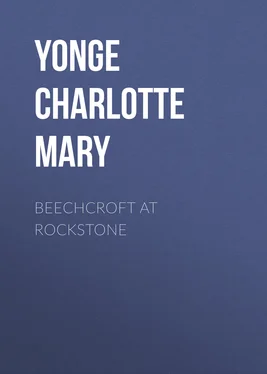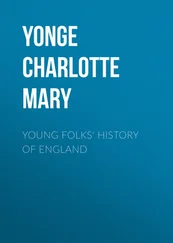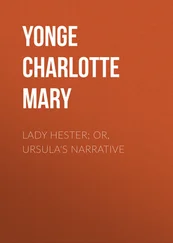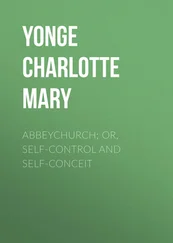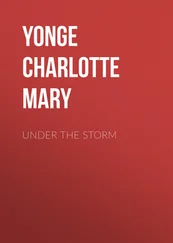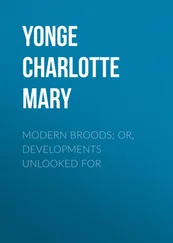Charlotte Yonge - Beechcroft at Rockstone
Здесь есть возможность читать онлайн «Charlotte Yonge - Beechcroft at Rockstone» — ознакомительный отрывок электронной книги совершенно бесплатно, а после прочтения отрывка купить полную версию. В некоторых случаях можно слушать аудио, скачать через торрент в формате fb2 и присутствует краткое содержание. Жанр: Альтернативная история, literature_19, Европейская старинная литература, foreign_antique, foreign_prose, Исторические приключения, на английском языке. Описание произведения, (предисловие) а так же отзывы посетителей доступны на портале библиотеки ЛибКат.
- Название:Beechcroft at Rockstone
- Автор:
- Жанр:
- Год:неизвестен
- ISBN:нет данных
- Рейтинг книги:4 / 5. Голосов: 1
-
Избранное:Добавить в избранное
- Отзывы:
-
Ваша оценка:
- 80
- 1
- 2
- 3
- 4
- 5
Beechcroft at Rockstone: краткое содержание, описание и аннотация
Предлагаем к чтению аннотацию, описание, краткое содержание или предисловие (зависит от того, что написал сам автор книги «Beechcroft at Rockstone»). Если вы не нашли необходимую информацию о книге — напишите в комментариях, мы постараемся отыскать её.
Beechcroft at Rockstone — читать онлайн ознакомительный отрывок
Ниже представлен текст книги, разбитый по страницам. Система сохранения места последней прочитанной страницы, позволяет с удобством читать онлайн бесплатно книгу «Beechcroft at Rockstone», без необходимости каждый раз заново искать на чём Вы остановились. Поставьте закладку, и сможете в любой момент перейти на страницу, на которой закончили чтение.
Интервал:
Закладка:
‘Wider, perhaps, not deeper, Jane,’ suggested Miss Adeline.
And Gillian thought—though she felt it would be too sentimental to say—that in her life, persons and scenes outside her own family had seemed to ‘come like shadows and so depart’; and there was a general sense of depression at the partings, the anxiety, and the being unsettled again when she was just beginning to have a home.
CHAPTER III. – PERPETUAL MOTION
If Fergus had not yet discovered the secret of perpetual motion, Gillian felt as if Aunt Jane had done so, and moreover that the greater proportion of parish matters were one vast machine, of which she was the moving power.
As she was a small spare woman, able to do with a very moderate amount of sleep, her day lasted from 6 A.M. to some unnamed time after midnight; and as she was also very methodical, she got through an appalling amount of business, and with such regularity that those who knew her habits could tell with tolerable certainty, within reasonable limits, where she would be found and what she would be doing at any hour of the seven days of the week. Everything she influenced seemed to recur as regularly as the motions of the great ruthless-looking engines that Gillian had seen at work at Belfast; the only loose cog being apparently her sister Adeline, who quietly took her own way, seldom came downstairs before eleven o’clock, went out and came in, made visits or received them, wrote letters, read and worked at her own sweet will. Only two undertakings seemed to belong to her—a mission working party, and an Italian class of young ladies; and even the presidency of these often lapsed upon her sister, when she had had one of those ‘bad nights’ of asthma, which were equally sleepless to both sisters. She was principally useful by her exquisite needlework, both in church embroidery and for sales; and likewise as the recipient of all the messages left for Miss Mohun, which she never forgot, besides that, having a clear sensible head, she was useful in consultation.
She was thoroughly interested in all her sister’s doings, and always spoke of herself as the invalid, precluded from all service except that of being a pivot for Jane, the stationary leg of the compasses, as she sometimes called herself. This repose, together with her prettiness and sweetness of manner, was very attractive; especially to Gillian, who had begun to feel herself in the grip of the great engine which bore her along without power of independent volition, and with very little time for ‘Hilda’s Experiences’.
At home she had gone on harmoniously in full acquiescence with household arrangements; but before the end of the week the very same sensations came over her which had impelled her and Jasper into rebellion and disgrace, during the brief reign of a very strict daily governess, long ago at Dublin. Her reason and sense approved of all that was set before her, and much of it was pleasant and amusing; but this was the more provoking by depriving her of the chance of resistance or the solace of complaint. Moreover, with all her time at Aunt Jane’s disposal, how was she to do her great thing? Valetta’s crewel battle cushion had been reduced to a delicious design of the battle of the frogs and mice, drawn by Aunt Ada, and which she delighted in calling at full length ‘the Batrachyomachia,’ sparing none of the syllables which she was to work below. And it was to be worked at regularly for half an hour before bed-time. Trust Aunt Jane for seeing that any one under her dominion did what had been undertaken! Only thus the spontaneity seemed to have departed, and the work became a task. Fergus meanwhile had set his affections on a big Japanese top he had seen in a window, and was eagerly awaiting his weekly threepence, to be able to complete the purchase, though no one but Valetta was supposed to understand what it had to do with his ‘great thing.’
It was quite pleasant to Gillian to have a legitimate cause of opposition when Miss Mohun made known that she intended Gillian to take a class at the afternoon Sunday-school, while the two children went to Mrs. Hablot’s drawing-room class at St. Andrew’s Vicarage, all meeting afterwards at church.
‘Did mamma wish it?’ asked Gillian.
‘There was no time to mention it, but I knew she would.’
‘I don’t think so,’ said Gillian. ‘We don’t teach on Sundays, unless some regular person fails. Mamma likes to have us all at home to do our Sunday work with her.’
‘Alas, I am not mamma! Nor could I give you the time.’
‘I have brought the books to go on with Val and Ferg. I always do some of their work with them, and I am sure mamma would not wish them to be turned over to a stranger.’
‘The fact is, that young ladies have got beyond Sunday-schools!’
‘No, no, Jane,’ said her sister; ‘Gillian is quite willing to help you; but it is very nice in her to wish to take charge of the children.’
‘They would be much better with Mrs. Hablot than dawdling about here and amusing themselves in the new Sunday fashion. Mind, I am not going to have them racketing about the house and garden, disturbing you, and worrying the maids.’
‘Aunt Jane!’ cried Gillian indignantly, ‘you don’t think that is the way mamma brought us up to spend Sunday?’
‘We shall see,’ said Aunt Jane; then more kindly, ‘My dear, you are right to use your best judgment, and you are welcome to do so, as long as the children are orderly and learn what they ought.’
It was more of a concession than Gillian expected, though she little knew the effort it cost, since Miss Mohun had been at much pains to set Mrs. Hablot’s class on foot, and felt it a slight and a bad example that her niece and nephew should be defaulters. The motive might have worked on Gillian, but it was a lower one, therefore mentioned.
She had seen Mrs. Hablot at the Italian class, and thought her a mere girl, and an absolute subject of Aunt Jane’s stumbling pitifully, moreover, in a speech of Adelchi’s; therefore evidently not at all likely to teach Sunday subjects half so well as herself!
Nor was there anything amiss on that first Sunday. The lessons were as well and quietly gone through as if with mamma, and there was a pleasant little walk on the esplanade before the children’s service at St. Andrew’s; after which there was a delightful introduction to some of the old books mamma had told them of.
They were all rather subdued by the strangeness and newness of their surroundings, as well as by anxiety. If the younger ones were less anxious about their parents than was their sister, each had a plunge to make on the morrow into a very new world, and the Varleys’ information had not been altogether reassuring. Valetta had learnt how many marks might be lost by whispering or bad spelling, and how ferociously cross Fraulein Adler looked at a mistake in a German verb; while Fergus had heard a dreadful account of the ordeals to which Burfield and Stebbing made new boys submit, and which would be all the worse for him, because he had a ‘rum’ Christian name, and his father was a swell.
Gillian had some experience through her elder brothers, and suspected Master Varley of being guilty of heightening the horrors; so she assured Fergus that most boys had the same sort of Christian names, but were afraid to confess them to one another, and so called each other Bill and Jack. She advised him to call himself by his surname, not to mention his father’s title if he could help it, and, above all, not to seem to mind anything.
Her own spirits were much exhilarated the next morning by a note from Harry, the recipient of all telegrams, with tidings that the doctors were quite satisfied with Sir Jasper, and that Lady Merrifield had reached Brindisi.
There was great excitement at sight of a wet morning, for it appeared that an omnibus came round on such occasions to pick up the scholars; and Valetta thought this so delightful that she danced about exclaiming, ‘What fun!’ and only wishing for Mysie to share it. She would have rushed down to the gate umbrellaless if Aunt Jane had not caught and conducted her, while Gillian followed with Fergus. Aunt Jane looked down the vista of young faces—five girls and three boys—nodding to them, and saying to the senior, a tall damsel of fifteen,
Читать дальшеИнтервал:
Закладка:
Похожие книги на «Beechcroft at Rockstone»
Представляем Вашему вниманию похожие книги на «Beechcroft at Rockstone» списком для выбора. Мы отобрали схожую по названию и смыслу литературу в надежде предоставить читателям больше вариантов отыскать новые, интересные, ещё непрочитанные произведения.
Обсуждение, отзывы о книге «Beechcroft at Rockstone» и просто собственные мнения читателей. Оставьте ваши комментарии, напишите, что Вы думаете о произведении, его смысле или главных героях. Укажите что конкретно понравилось, а что нет, и почему Вы так считаете.
